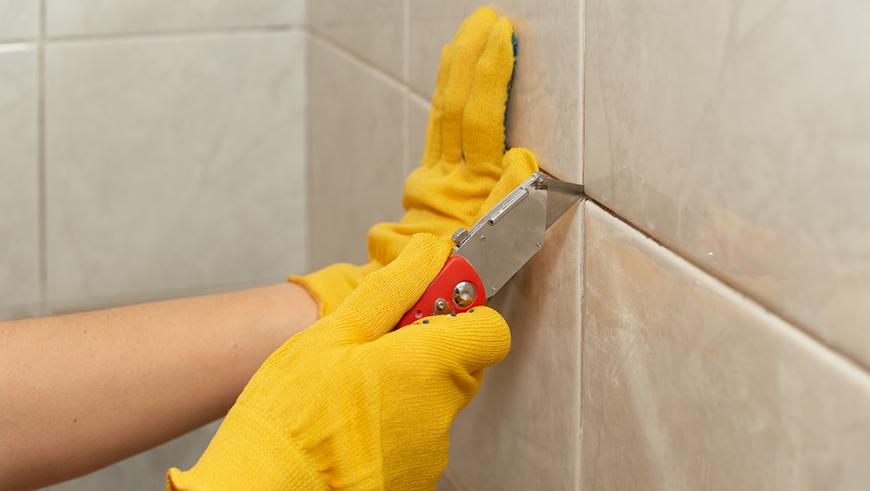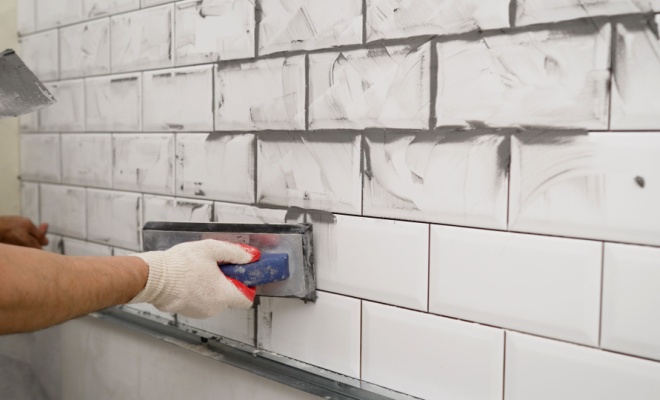Cost to Regrout Bathroom Tiles
Last updated 20th May, 2025
Are you interested in the cost of regrouting your bathroom?
This article covers all you need to know about regrouting tiles. We explore the costs involved to regrout, the timeframes, supply costs, labour fees, and even explain how to regrout tiles. We really leave no tile unturned!
Typically, regrouting bathroom tiles costs between £220 and £270 for the entire room.
Keep reading below!

How Much to Regrout a Bathroom?
There are a number of reasons why people decide to clean, remove and replace grouting in the bathroom. Probably the most common reason is simply that's the grout colour has faded and looks dirty so needs changing.
The next most common reason is that the grout is cracked, crumbling or missing out of the joints, this can happen if the grouting was not done properly in the first place or it could simply be due to the age of the grout.
If the grout is simply stained or black and mouldy, then usually it can simply be cleaned using some sort of bleach preparation to remove the mould.
Removing and replacing the grout can transform your bathroom tiling and make it look brand new again, but this won't last if you have a mould problem and you do not address the root cause. If the mould is brown in colour this can often mean water is getting behind the wall tiles and soaking through the joints. In this case there is no point re-grouting until you have found and fixed the leak.
To remove the old grout a drill is perhaps the ideal tool as you can go over the surface of the grout removing as much as possible without damaging the actual tiles. When using power tools to remove grout, always wear safety goggles as flying debris could possibly injure your eyes.
Once you have removed as much grout as possible with power tools you can finish the job with a screwdriver or a Stanley knife blade then going over the surface with a vacuum cleaner to remove any last traces.
So, which type of grout do I need?
There are many different types of grout for tiles, some of which are designed for floor tiles and some for walls. There are ready-mixed grout products and others you have to mix yourself, but if you are replacing your grout due to mould problems then some grout products have built-in bacterial and antifungal protection which may be useful. The ready-mix grouts on sale are far easier to use and are highly recommended.
Regrouting Prices
To provide accurate pricing information we have contacted local and national companies, plus have used various online quotation tools. The figures provided should give a good rough idea of the costs involved if you are looking to regrout your bathroom tiles. You should of course gather relevant quotes from local bathroom specialists and handymen so as to get the best price for your requirements. You can get up to 3 free quotes from local tradespeople by clicking the "Get a Quote" button.
The average material cost to regrout bathroom tiles will depend on the price and quality of the grout, as well as the size of your bathroom (how many tiles need regrouting). Typically you can pick up a 12.5kg bag for £15 to £20.
The average bathroom specialist will usually charge around £150 per day. The total cost of regrouting bathroom tiles will mainly be from the labour with very little material costs. Depending on the size of the area to be regrouted, you can expect it to take anywhere from 1-2 days to fully regrout your bathroom.
Below are some estimated costs to clean and replace the grouting of your bathroom tiles:
| Job Description | Avg. Cost | Duration |
|---|---|---|
| Tile Grout | £15-£20 per 12.5kg Bag | N/A |
| Labour to Re-Grout Bathroom | £200-£250 | 1-2 days |
| Total Cost | £220-£270 | 1-2 days |
Table of Contents
DIY Regrouting Bathroom Tiles
Before you start removing the existing grout it is always worth seeing if it's possible to salvage any first by giving it a clean and using a suitable mould treatment. There are also some great tile revival systems on sale which can clean and colour your tiles, in many cases avoiding the labour intensive cost of completely replacing or regrouting your bathroom tiles.
Sometimes you can simply make your own cleaning solution using bleach and baking soda to make a paste, which can then be applied to the old grout using a toothbrush. But please remember if you're using bleach always wear goggles and gloves with old clothes.
Home-made grout cleaners will work but not in all cases, however, they are so cheap to make that it's always worth giving them a try. Although the fact that you're reading this article probably means you have already tried cleaning, and decided that regrouting tiles is now your only real option.
Removing Existing Grout
When regrouting bathroom tiles, be careful removing the exisiting grout as it is possible you could chip or crack the tiles. This will make the job take longer and increase the cost of regrouting your bathroom due to replacing tiles that are broken or cracked - assuming you can even find ones to match!
If you do damage the bathroom tiles you need to remove any grout and use a chisel to remove the rest of the tile. For the replacement, apply adhesive to the back of the tile and position it using spacers to maintain proper grout gaps. Once the adhesive has set, remove the spacers and grout the joints.
Regrouting Bathroom Tiles
To regrout your bathroom tiles you will need the following equipment:
- Specialist grouting tool called a "grout float"
- Container to mix your grout in*
- Something suitable to mix it with*
- Scraper to get rid of any excess
- Damp sponge for cleaning
*Unless you have purchased a ready-mixed variety.
Start by mixing your grout if required, making sure you follow the manufacturer's guidelines.
Next, use the grout float to push the grout firmly into place between the tiles, while holding the float at a 45-degree angle to achieve the required result.
Work in small sections at a time, cleaning off any excess grout as you go along, as this will be easier than wiping it off once the grout has dried.
When you have finished grouting, leave it to set before using a damp sponge to clean the tiles and remove the last of any excess grout. Setting time for grout is normally around 10 to 15 minutes, but always remember to check the instructions first.
Hire a Professional Bathroom Tiler
There are times when it's just not practical to regrout bathroom tiles yourself.
If the grout is severely cracked, crumbling, or mouldy, it’s best to hire a professional - especially if the damage is due to water damage or you're looking to redecorate the entire bathroom.
An experienced tiler can properly review the work that needs doing, and advise if there are any additional problems that need looking at.
Alternatively, regrouting your bathroom may turn out to be a bigger job than anticipated, such as a larger room or one with hard to reach areas. Likewise, if you simply don't have the time or confidence to take on the challenge on your own, hiring a professional bathroom tiler may be the more sensible option.
Cost Breakdown
Individual costs to remove and re-grout a bathroom - Total Cost: £250
Materials
£25
Tradesmen
£225
Waste Removal
£0
Cost Affecting Factors of Regrouting Bathroom Tiles
It's always good to understand the variables that might increase or decrease the price of a job. Here are the things to consider when regrouting a bathroom:
Area to be Regrouted
A larger area means more grouting and more time taken, which will increase costs.
Condition of Existing Grouting
Severely damaged grouting and tiles might be an indication of moisture having collected under the tiles. This means more damage to fix before regrouting, which is likely to increase costs.
Type of Grout
Different types of grout sell at different price points. If you opt for anti-bacterial and anti-fungal mixtures, you'll have to pay more, but it might well be worth it!

Ease of Access
If the entire area to be regrouted is easily accessible, the job will be much swifter and will save some money on labour fees. On the flipside, awkward or hard-to-reach areas will take longer and regrouting your bathroom tiles will cost more in labour fees.
Geographical Location
Unfortunately we're all at the mercy of our local pricing trends, so contractors in some areas will be more expensive than others.










